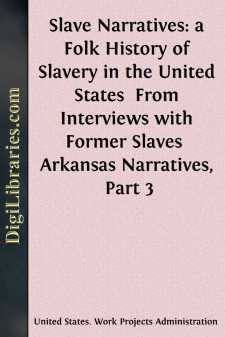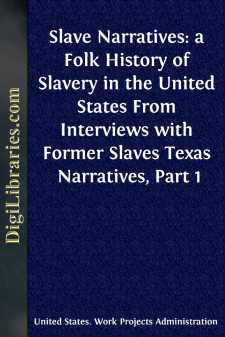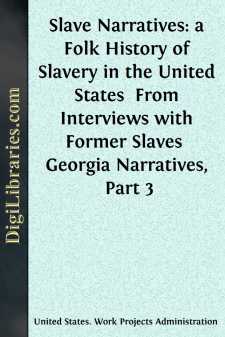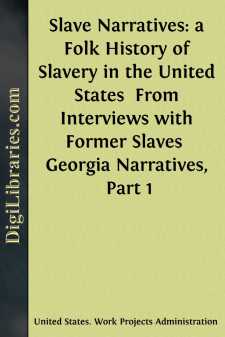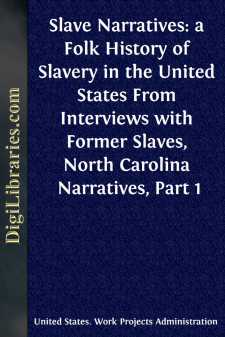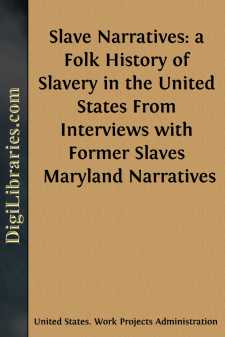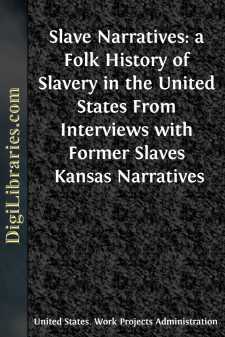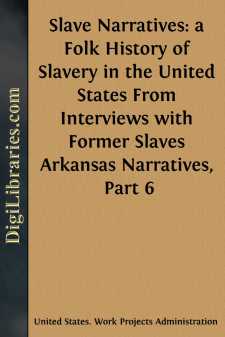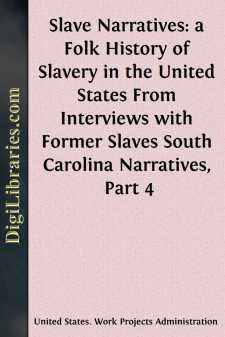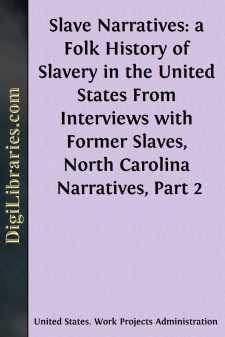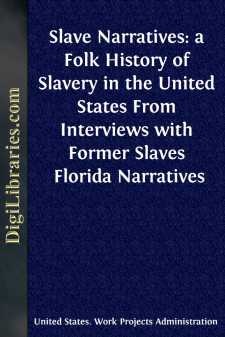Categories
- Antiques & Collectibles 13
- Architecture 36
- Art 48
- Bibles 22
- Biography & Autobiography 813
- Body, Mind & Spirit 141
- Business & Economics 28
- Children's Books 12
- Children's Fiction 9
- Computers 4
- Cooking 94
- Crafts & Hobbies 4
- Drama 346
- Education 46
- Family & Relationships 57
- Fiction 11826
- Games 19
- Gardening 17
- Health & Fitness 34
- History 1377
- House & Home 1
- Humor 147
- Juvenile Fiction 1873
- Juvenile Nonfiction 202
- Language Arts & Disciplines 88
- Law 16
- Literary Collections 686
- Literary Criticism 179
- Mathematics 13
- Medical 41
- Music 40
- Nature 179
- Non-Classifiable 1768
- Performing Arts 7
- Periodicals 1453
- Philosophy 64
- Photography 2
- Poetry 896
- Political Science 203
- Psychology 42
- Reference 154
- Religion 513
- Science 126
- Self-Help 83
- Social Science 81
- Sports & Recreation 34
- Study Aids 3
- Technology & Engineering 59
- Transportation 23
- Travel 463
- True Crime 29
Slave Narratives: a Folk History of Slavery in the United States From Interviews with Former Slaves Arkansas Narratives, Part 3
Categories:
Description:
Excerpt
Interviewer: Samuel S. Taylor
Person interviewed: Dr. D. B. Gaines
1720 Izard Street, Little Rock, Arkansas
Age: 75
“I was born in 1863 and am now seventy-five years old. You see, therefore, that I know nothing experimentally and practically about slavery.
“I was born in South Carolina in Lawrence County, and my father moved away from the old place before I had any recollection. I remember nothing about it. My father said his master’s name was Matthew Hunter.
“I was named for my father’s master’s brother, Dr. Bluford Gaines. My name is Doctor Bluford Gaines. Of course, I am a doctor but my name is Doctor.
“My father’s family moved to Arkansas, in 1882. Settled near Morrilton, Arkansas. I myself come to Little Rock, Arkansas, in 1885, October eighth. Worked in the homes of white families for my board and entered Philander Smith College October 8, 1885. Continued to work with Judge Smith of the Arkansas Supreme Court until I graduated from Philander Smith College. After graduating I taught school and was elected Assistant Principal of the Little Rock Negro High School in 1891. Served three years. Accumulated sufficient money and went to Meharry Medical College, Nashville, Tennessee. Graduated there in 1896. Practiced for five years in the city of Little Rock. Entered permanently upon the ministry in 1900. Was called to the Mount Pleasant Baptist Church where I have been pastoring for thirty-nine years the first Sunday in next May.
“The first real thing that made me switch from the medicine to the ministry was the deep call of the ministry gave me more interest in the Gospel than the profession of medicine furnished to me. In other words, I discovered that I was a real preacher and not a real doctor.
“Touching slavery, the white people to whom my parents belonged were tolerant and did not allow their slaves to be abused by patrollers and outsiders.
“My mother’s people, however, were sold from her in very early life and sent to Alabama. My mother’s maiden name was Harriet Smith. She came from South Carolina too. Her old master was a Smith. My mother and father lived on adjoining plantations and by permission of both overseers, my father was permitted to visit her and to marry her even before freedom. Out of regard for my father, his master bought my mother from her master. I think my father told me that the old master called them all together and announced that they were free at the close of the War. Right after freedom, the first year, he remained on the farm with the old master. After that he moved away to Greenville County, South Carolina, and settled on a farm, with the brother-in-law of his old master, a man named Squire Bennett. He didn’t go to war.
“There was an exodus of colored people from South Carolina beginning about 1880, largely due to the Ku Klux or Red Shirts. They created a reign of terror for colored people in that state. He joined the exodus in 1882 and came to Arkansas where from reports, the outlook seemed better for him and his family. He had no trouble with the Ku Klux in Arkansas. He maintained himself here by farming.”
Opinions
“It is my opinion that from a racial standpoint, the lines are being drawn tighter due to the advancement of the Negro people and to the increased prejudice of the dominant race....


